The Journals of Ayn Rand Read online
Page 27
CHAPTER XIV: Gowan’s Station. Talk with Heller on commissions. Three refused clients. Fargo Store. Sanborn House. Heddy.
His unsocialness—as expressed by Heller. His quiet stubbornness with clients. More of his thoughts on architecture. A touch of the unconventional in meeting with Heddy. His “caste-system” with people. [This last reference is to the following passage, later cut: “He seldom looked at women; there were few whom he could want, as there were few people to whom he could speak. He had an instinctive caste-system of his own; he looked for a mark upon each forehead; a mark clear to him in the lines of a face, unseen by everyone else; without that mark men did not seem to exist for him, nor women; they lost all reality to him and he lost all response. When he found that mark, the stamp of a peculiar freedom that was more than freedom, he looked upon his finds with interest and eagerness.... ”] CHAPTER XV: Idleness. Heddy. Holcombe’s bribe. Help Keating with competition project.
Calm in the face of idleness. Lighter touch with Heddy. Takes no advantage of his connections. Refuses Holcombe—wonders about Holcombe’s reasons. Won’t enter competition.
CHAPTER XVI: Scene with Keating. Refuses bank commission. Leaves for Connecticut.
Contempt for Keating—won’t take money he needs. Torture and almost breakdown from waiting. The great bank commission. Refuses. Ruthlessness toward himself in his decision to work as common laborer.
Keating
CHAPTER I: Reference to him by Mrs. Keating.
His brilliance as a student.
CHAPTER II: Graduation. Talk with Roark. Decision about job.
Brilliance and popularity. His second-hand absorption with his relation to other people and with his superiority to them. Insincerity with people. Touch of sincerity with Roark—his helplessness and lack of assurance. Lets mother influence him, even though he neither loves nor respects her. Mother pushed him into career.
CHAPTER III: First day in Francon’s office.
Lack of assurance—gains it only from comparing himself to others. Clever playing up to Francon—dig at Stengel.
CHAPTER IV: Relations with Francon, takes over Davis’ work, scene with Katie.
Taking Francon into his hands, insincerity and shrewdness in dealing with Davis, sincerity and vagueness with Katie, his own better side which he cannot sustain, confesses to her his real opinion of Francon and his career, exhibits good touch in refusing to meet Toohey.
CHAPTER V: Establishes himself in office, betrays Davis.
Servility and appeal to clients, unprincipled ruthlessness in advancing himself, weakness in avoiding Katie, cheap love affairs, touch of hypocrisy with mother.
CHAPTER VI: Gets rid of Stengel. Hisfirst designing job.
Subtle diplomacy, treachery to Francon in his manner of eliminating Stengel, orgies with Francon. Attitude on his work—only fear, no real ideas or creative impulse. Runs to Roark—accepts his help and resents him.
CHAPTER VII: Steady advance. Proposal to Katie.
Beginning of fourflushing with money and position. Hints about Francon’s daughter. He is greatly satisfied with himself—has lost the sincerity of admitting anything to Katie, doesn’t see it any more, loves Francon and his position, wouldn’t mind meeting Toohey, indifference to work, concentrates on the social side of it. But proposes to Katie—somewhat unexpectedly, as a last flash of his better self.
CHAPTER VIII: Gets Roark into Francon ’s office.
Fourflushing before Roark. Needs Roark, uses him, yet in a way feels superior, enjoys subtly insulting Roark and ordering him about. CHAPTER IX: Does nothing for Roark after Roark is fired.
Drops Roark when he feels he needs him no longer.
CHAPTER X: Strike. Protest meeting. Sees Dominique.
His restlessness and doubts when left alone and idle. Needs Katie. His fear at her absorption in Toohey. Sees Dominique—and decides to follow it up, even though he fears and dislikes her. CHAPTER XI: Holcombe’s party. Meets Dominique. Francon’s hints.
Pursues Dominique, plans to take advantage ofFrancon—even though he doesn’t really like Dominique.
CHAPTER XII: Scene in Roark’s new office.
Resents Roark’s success and advancement over him. Instinctively, not understanding it and bewildered by it. Later—nasty, patronizing remarks about Roark.
CHAPTER XIII: Luncheon with Dominique. Scene when Katie asks him to marry her—and the consequences.
Goes after Dominique without warning her. Realizes he’s planned two futures; decides to let future decide and drifts. His love for Katie asserts itself when he is ready to marry her, has feeling of his own danger, but lets his mother and the considerations of other people—career, Francon, society, church, etc.—stop him. Would have gone through if Katie insisted, but she doesn’t and he lets it go. His uncertainty and reliance upon others.
CHAPTER XV: Campaign against Heyer. The Cosmo-Slotnick competition. Love scene with Dominique.
Ruthlessness in his hounding of Heyer. Weakness on the Cosmo-Slotnick competition, dread of another winner, hysterical vanity, runs to Roark again. Is physically infatuated with Dominique, is terribly disappointed, but still proposes to her.
CHAPTER XVI: Heyer’s death. Wins competition. Scene with Roark. Celebration ofpartnership.
Horrible cruelty to Heyer. Triumph of vanity and “second-handedness” in his attitude on winning competition. Slight hint of conscience in thought of Roark. Attempts to talk Roark into conventional attitude—doesn’t know what prompts him. Attempts to bribe Roark—and screams his hatred of him, realizing Roark’s contempt. Celebration of partnership—“second-hand” satisfaction.
Toohey
CHAPTER IV: Article in New Frontiers—first hint of his philosophy.
CHAPTER VI: Katie’s talk about him—hints on his manner and methods. Small mention—Keating’s fear of him.
CHAPTER VII: “Sermons in Stones”—radicalism, criticism of present economic system, down with individuals, glorifying the masses, glorifying the united and the obedient, attack on modern architecture. Brilliance of style and erudition.
Katie about him: the beginning of her absorption, his indifference to the clippings, and yet... his making speech at Union.
CHAPTER X: His column on the Banner. The situation on the strike, the noble gesture of a public martyr. The speech—stress on organization and the lack of freedom in individual choice. The magnetism of his voice. Katie’s absorption in him frightens Keating.
CHAPTER XI: Dominique on Toohey—the perfect skunk, the monolith, his threat to the world, the testing stone.
CHAPTER XV: Said nothing about the Heller house.
CHAPTER XII: Katie’s fit of terror of him.
CHAPTER XV: On Cosmo-Slotnick competition jury.
Wynand
CHAPTER V: First mention of papers—“gas-station murder.”
CHAPTER VI: Cameron’s mention: “legs, crusade against wealth, rights of the downtrodden, unwed mothers, recipes, utility companies, horoscopes.” Circulation growing.
CHAPTER IX: Francon’s reference to Lili Lansing. The castle, the party (Caesar Borgia) and the photos with children.
CHAPTER X: Wynand on the strike. Reverses principles when it hits him. His real estate operations. His unpredictable inconsistency. The appeals to trashy patriotism. People’s dread of him and his vengeance. Heller’s reference to him. The startling gesture toward Toohey.
CHAPTER XI: Dominique on Wynand—great art lover and perfect sideshow baiter. Decadent.
CHAPTER XII: The slums campaign. Wynand on a world cruise. Alvah Scarret.
February 18, 1940
[AR critiques her first draft of Part I.]
[The Chapter I scene in] Roark’s room: Is it necessary at all? If so—do better, put in more character.
CHAPTER I: Roark planted too soon—too much of him given—too obviously heroic—the author’s sympathy too clear. (?) Don’t like Roark’s outbreak with Dean—can be treated differently. Don’t dialogue thoughts—narrate them (such as the Dean’s and Mrs. Keating’s). Roark changing his drawing—too much detail. (?) In this first chapter—plant Roark: ornament—that his buildings are not modernistic boxes?
CHAPTER II: Change Mrs. Keating’s approach to a subtler and meaner one—like the one she uses later about Katie. Give one speech on Keating’s attitude about architectural convictions. (?) CHAPTER III: Miss Bisbee—unnecessary? Too long about Francon’s office—can be cut. Cameron’s biography should be gone over—some awkward passages. Cameron’s criticism of Roark’s drawings—don’t like it.
CHAPTER IV: Details about Tim Davis—unnecessary. Make it shorter. Roark’s life and his tenement room—can be done better, simpler, there’s a little too obvious an effect there. Cameron giving Roark a raise—too much niceness. (?) Don’t have Cameron dropping his head on his arms.
CHAPTER V: Roark looking for the “stamp” on faces—should be planted earlier and separately and more importantly. Omit incident with faked plans—too much and too detailed. Change it to narrative of Davis simply becoming useless, being crowded out—and never knowing how it was done and Keating remaining his best friend and even giving him a job and boasting of this “good deed.” Don’t like all of incident with Roark fixing building—too long—technically dishonest—and Roark too able. Cameron’s struggle against contractor unnecessary—reserve that for Roark’s future. [AR cut this last scene—it has been reprinted in The Early Ayn Rand.]
CHAPTER VI: First reference to the Wynand papers should be separate and more important. On Vesta’s first resentment [of Roark]—here is the place to put the other side of her character—the “social” one.
The Dunlop incident—couldn’t it be cut? Important psychologically and as example of Keating’s methods—but perhaps too detailed for a mere incid
ent. Keating’s first job of designing—shorter and clearer. Roark’s corrections—all the details or none. Narrative would be better than dialogue. The Cameron sequence from Austen Heller to flashback and back again is bad. Put flashback and [summary] of past year first, then on to Heller and the Wynand papers. This is the place for the first mention of the Wynand papers.
CHAPTER VII: Better last paragraph of office closing sequence—more emphasis for drawing on the wall. In resume of Keating’s rise—stress more (and most) the second-handedness: his worrying about people’s admiration for him and people’s envy, his comparing his achievements with others, his “good deeds”—and boasting of them. Mrs. Keating’s arrival not very well worded. Also—the transition to Katie.
CHAPTER VIII: Cut some of Keating’s cruder insults to Roark. Keating must be much subtler in this. More about Mike—show why Roark likes him and why Roark would like him immediately.
CHAPTER IX: Shorter on Roark’s looking for a job. No need for single incidents; they can all be blended into one narrative—all except Prescott.
CHAPTER X: Lead up into the strike—simpler and more authentic.
CHAPTER XI: Better and clearer summary of Roark’s six months with Snyte.
CHAPTER XII: Cut out Heller’s thoughts on men’s interdependence. Much too early. Leave just the friendship angle—the unselfish devotion. Don’t like Roark’s talk on architecture—give it better build-up, lead into it better, and also better wording and more original thoughts and expressions. Heller’s biography—very last. More pointed and fresher.
CHAPTER XIV: Cut out Heddy entirely. I don’t think that Roark needs another love. Cut out Sanboms—too detailed for this part of the book—not detailed enough in itself. Perhaps cut Fargo Store—another way of covering this period has to be found.
CHAPTER XV: Cut out Heddy. Cut out Holcombe incident—or put in another one like it instead.
CHAPTER XVI: In conversation with Mike—plant that Roark does not want a white-collar job. Control the obvious, pointless exaggerations in the description of the movie furor.
About first part in general:
Do not dialogue thoughts. Control adjectives—cut the weakening ones. Do not use adjectives unless they are different and illuminating. Don’t go into over-detailed analyses of psychology—unless it’s something new and illuminating to say. Don’t give any details whatever—in sentences or thoughts—unless you have something new to say.
Stress the second-handedness whenever possible, particularly in Keating, but a different facet of it each time. Cut out episodes that do not bear on that theme. The book is not about architecture, it’s about Roark against the world and about the workings of that thing in the world which opposes him. Give only enough pure architecture to make the background real. But only as a background. Eliminate bromides or convenient colloquial expressions ready-made, even in places that are mere transitions, such as “and it made film history,” “round of nightclubs,” etc.
Undated
[For the scene by the granite quarry, when Roark and Dominique speak for the first time.]
Estrangement—antagonism.
Her putting him in his place as a worker.
Her directness and defiant wit.
His mockery in his quiet acceptance of the position she is imposing upon him—and when she attempts (faintly) to bring in the personal, it is he who refuses, sticking to the “Yes, Miss Francon” attitude of a respectful worker.
[Roark:] “You want me and I know it and I’ll make it vile, to show you the enormity of your desire, because you’ll want me still. I’m obedient to you now, I’m nothing before you—and it won’t change things. I’ll crush you in spite of it, because of it, when the time comes.”
[Dominique:] “I have you in my power. I’ll torture you. I enjoy it. I want you to know that. I enjoy debasing you, because I’m debasing myself through it, because you’ll conquer me some day—I want it—I hate you and I’ll punish you for it.”
All this on what appears as a discussion of his living conditions and her interest in the workers.
“You’re boasting.” “No, but ... it changes so little.” “In what?” “In your interest in workers. In the future. There are so many unchangeable things.”
February 21, 1940
Toohey [promotes] Keating—because he knows that Keating did not design the Cosmo-Slotnick building.
Toohey writes a profound article on Keating’s work, and tests Keating by asking him if he did mean all those things, knowing quite well that he, Toohey, has made them up. Keating agrees that he did—and Toohey is happy. Keating isn’t quite sure whether he did mean all that or not and is not sure whether Toohey knows it or not, but is very sure that Toohey is pleased. (These touches in Toohey must be very subtle, vague and rare—only as a hint, particularly at first. Most of Toohey must seem to be very authentic, noble and “humanitarian.”)
Toohey builds Keating up in print. Gives him commissions. Organizes the “Youth Club” of the A.G.A. with Keating as head. He controls the architectural profession through Keating. Disgrace to young sculptor on one of the buildings. (When Toohey switches to modernism, “Youth Club” switches with him.) The “youth”—and Keating—want to be “deep,” learn nothing, are glad to have it given to them by Toohey. He drives Keating into complete spiritual dependence upon him. He inflates Keating with false, empty values—knowing they are empty, knowing that Keating will feel the emptiness without understanding it—and will, therefore, be ruined for any values. The emptier he is, the more Keating will need Toohey.
Toohey alone among his associates guesses at Wynand’s real nature—at least to the extent of knowing that Wynand is not a mob-man at heart. Toohey, contrary to the dictates of his usual clever diplomacy, tries very hard to appear as a hero and a “man of integrity” before Wynand. Wynand ignores him completely, never considers him worth breaking. This makes Toohey furious—relegating him to the kind of man he knows himself to be.
February 22, 1940
Part II must show Keating at his height, enjoying himself immensely (his idea of enjoyment, and the essential meaninglessness of it)—and plant the first seeds for his later downfall (mainly through Toohey getting hold of his spirit, because of the emptiness of that spirit).
February 24, 1940
Toohey’s [purpose is] to ruin the strong, the single, the original, the healthy, the joyous—with the weapon of “other people,” of humanitarianism. To excuse all sins in kindness—and thereby to destroy all virtue. To kill happiness—in order to have slaves. No man is dangerous to him-except the happy man. He exists like a maggot—on wounds and sores.
Undated
Toohey’s greatest enemy—independence of spirit.
The first result of [independence] is great creation.
Toohey destroys all independence in people and all great achievement.
For the first: independence causes happiness. Toohey is out to destroy and discredit—philosophically and practically—all happiness. Unhappy people look for a yoke—and they come to him.
For the second: To discredit great achievement, he sets up standards which are easy for the phonies. Hence—Toohey and Gertrude Stein, Walt Disney, and Ferdinand the Bull. [Gertrude Stein seems to have been the model for the character Lois Cook, whose first name was originally Gertrude.]
For the first: Catherine, Peter, Dominique, Dick Sanborn, attempt (later) at Wynand. (Also Vesta.) [This is the last mention of Vesta Dunning in AR’s notes.]
For the second: Roark, sculptor, young writer, Heller, Peter as architect, death notice on Cameron.
The author of Ferdinand the Bull made into a “philosopher” by Toohey, as against the young writer.
February 28, 1940
For Gertrude [Lois Cook]: deliberate sloppiness—as careful as grooming—and for the same purpose.
Toohey’s behavior after the assassination attempt—“theatrical only in too complete an absence of anything theatrical.” Toohey is on his way to some “humanitarian lecture.”
Advance questions for Part II
His unsocialness—as expressed by Heller. His quiet stubbornness with clients. More of his thoughts on architecture. A touch of the unconventional in meeting with Heddy. His “caste-system” with people. [This last reference is to the following passage, later cut: “He seldom looked at women; there were few whom he could want, as there were few people to whom he could speak. He had an instinctive caste-system of his own; he looked for a mark upon each forehead; a mark clear to him in the lines of a face, unseen by everyone else; without that mark men did not seem to exist for him, nor women; they lost all reality to him and he lost all response. When he found that mark, the stamp of a peculiar freedom that was more than freedom, he looked upon his finds with interest and eagerness.... ”] CHAPTER XV: Idleness. Heddy. Holcombe’s bribe. Help Keating with competition project.
Calm in the face of idleness. Lighter touch with Heddy. Takes no advantage of his connections. Refuses Holcombe—wonders about Holcombe’s reasons. Won’t enter competition.
CHAPTER XVI: Scene with Keating. Refuses bank commission. Leaves for Connecticut.
Contempt for Keating—won’t take money he needs. Torture and almost breakdown from waiting. The great bank commission. Refuses. Ruthlessness toward himself in his decision to work as common laborer.
Keating
CHAPTER I: Reference to him by Mrs. Keating.
His brilliance as a student.
CHAPTER II: Graduation. Talk with Roark. Decision about job.
Brilliance and popularity. His second-hand absorption with his relation to other people and with his superiority to them. Insincerity with people. Touch of sincerity with Roark—his helplessness and lack of assurance. Lets mother influence him, even though he neither loves nor respects her. Mother pushed him into career.
CHAPTER III: First day in Francon’s office.
Lack of assurance—gains it only from comparing himself to others. Clever playing up to Francon—dig at Stengel.
CHAPTER IV: Relations with Francon, takes over Davis’ work, scene with Katie.
Taking Francon into his hands, insincerity and shrewdness in dealing with Davis, sincerity and vagueness with Katie, his own better side which he cannot sustain, confesses to her his real opinion of Francon and his career, exhibits good touch in refusing to meet Toohey.
CHAPTER V: Establishes himself in office, betrays Davis.
Servility and appeal to clients, unprincipled ruthlessness in advancing himself, weakness in avoiding Katie, cheap love affairs, touch of hypocrisy with mother.
CHAPTER VI: Gets rid of Stengel. Hisfirst designing job.
Subtle diplomacy, treachery to Francon in his manner of eliminating Stengel, orgies with Francon. Attitude on his work—only fear, no real ideas or creative impulse. Runs to Roark—accepts his help and resents him.
CHAPTER VII: Steady advance. Proposal to Katie.
Beginning of fourflushing with money and position. Hints about Francon’s daughter. He is greatly satisfied with himself—has lost the sincerity of admitting anything to Katie, doesn’t see it any more, loves Francon and his position, wouldn’t mind meeting Toohey, indifference to work, concentrates on the social side of it. But proposes to Katie—somewhat unexpectedly, as a last flash of his better self.
CHAPTER VIII: Gets Roark into Francon ’s office.
Fourflushing before Roark. Needs Roark, uses him, yet in a way feels superior, enjoys subtly insulting Roark and ordering him about. CHAPTER IX: Does nothing for Roark after Roark is fired.
Drops Roark when he feels he needs him no longer.
CHAPTER X: Strike. Protest meeting. Sees Dominique.
His restlessness and doubts when left alone and idle. Needs Katie. His fear at her absorption in Toohey. Sees Dominique—and decides to follow it up, even though he fears and dislikes her. CHAPTER XI: Holcombe’s party. Meets Dominique. Francon’s hints.
Pursues Dominique, plans to take advantage ofFrancon—even though he doesn’t really like Dominique.
CHAPTER XII: Scene in Roark’s new office.
Resents Roark’s success and advancement over him. Instinctively, not understanding it and bewildered by it. Later—nasty, patronizing remarks about Roark.
CHAPTER XIII: Luncheon with Dominique. Scene when Katie asks him to marry her—and the consequences.
Goes after Dominique without warning her. Realizes he’s planned two futures; decides to let future decide and drifts. His love for Katie asserts itself when he is ready to marry her, has feeling of his own danger, but lets his mother and the considerations of other people—career, Francon, society, church, etc.—stop him. Would have gone through if Katie insisted, but she doesn’t and he lets it go. His uncertainty and reliance upon others.
CHAPTER XV: Campaign against Heyer. The Cosmo-Slotnick competition. Love scene with Dominique.
Ruthlessness in his hounding of Heyer. Weakness on the Cosmo-Slotnick competition, dread of another winner, hysterical vanity, runs to Roark again. Is physically infatuated with Dominique, is terribly disappointed, but still proposes to her.
CHAPTER XVI: Heyer’s death. Wins competition. Scene with Roark. Celebration ofpartnership.
Horrible cruelty to Heyer. Triumph of vanity and “second-handedness” in his attitude on winning competition. Slight hint of conscience in thought of Roark. Attempts to talk Roark into conventional attitude—doesn’t know what prompts him. Attempts to bribe Roark—and screams his hatred of him, realizing Roark’s contempt. Celebration of partnership—“second-hand” satisfaction.
Toohey
CHAPTER IV: Article in New Frontiers—first hint of his philosophy.
CHAPTER VI: Katie’s talk about him—hints on his manner and methods. Small mention—Keating’s fear of him.
CHAPTER VII: “Sermons in Stones”—radicalism, criticism of present economic system, down with individuals, glorifying the masses, glorifying the united and the obedient, attack on modern architecture. Brilliance of style and erudition.
Katie about him: the beginning of her absorption, his indifference to the clippings, and yet... his making speech at Union.
CHAPTER X: His column on the Banner. The situation on the strike, the noble gesture of a public martyr. The speech—stress on organization and the lack of freedom in individual choice. The magnetism of his voice. Katie’s absorption in him frightens Keating.
CHAPTER XI: Dominique on Toohey—the perfect skunk, the monolith, his threat to the world, the testing stone.
CHAPTER XV: Said nothing about the Heller house.
CHAPTER XII: Katie’s fit of terror of him.
CHAPTER XV: On Cosmo-Slotnick competition jury.
Wynand
CHAPTER V: First mention of papers—“gas-station murder.”
CHAPTER VI: Cameron’s mention: “legs, crusade against wealth, rights of the downtrodden, unwed mothers, recipes, utility companies, horoscopes.” Circulation growing.
CHAPTER IX: Francon’s reference to Lili Lansing. The castle, the party (Caesar Borgia) and the photos with children.
CHAPTER X: Wynand on the strike. Reverses principles when it hits him. His real estate operations. His unpredictable inconsistency. The appeals to trashy patriotism. People’s dread of him and his vengeance. Heller’s reference to him. The startling gesture toward Toohey.
CHAPTER XI: Dominique on Wynand—great art lover and perfect sideshow baiter. Decadent.
CHAPTER XII: The slums campaign. Wynand on a world cruise. Alvah Scarret.
February 18, 1940
[AR critiques her first draft of Part I.]
[The Chapter I scene in] Roark’s room: Is it necessary at all? If so—do better, put in more character.
CHAPTER I: Roark planted too soon—too much of him given—too obviously heroic—the author’s sympathy too clear. (?) Don’t like Roark’s outbreak with Dean—can be treated differently. Don’t dialogue thoughts—narrate them (such as the Dean’s and Mrs. Keating’s). Roark changing his drawing—too much detail. (?) In this first chapter—plant Roark: ornament—that his buildings are not modernistic boxes?
CHAPTER II: Change Mrs. Keating’s approach to a subtler and meaner one—like the one she uses later about Katie. Give one speech on Keating’s attitude about architectural convictions. (?) CHAPTER III: Miss Bisbee—unnecessary? Too long about Francon’s office—can be cut. Cameron’s biography should be gone over—some awkward passages. Cameron’s criticism of Roark’s drawings—don’t like it.
CHAPTER IV: Details about Tim Davis—unnecessary. Make it shorter. Roark’s life and his tenement room—can be done better, simpler, there’s a little too obvious an effect there. Cameron giving Roark a raise—too much niceness. (?) Don’t have Cameron dropping his head on his arms.
CHAPTER V: Roark looking for the “stamp” on faces—should be planted earlier and separately and more importantly. Omit incident with faked plans—too much and too detailed. Change it to narrative of Davis simply becoming useless, being crowded out—and never knowing how it was done and Keating remaining his best friend and even giving him a job and boasting of this “good deed.” Don’t like all of incident with Roark fixing building—too long—technically dishonest—and Roark too able. Cameron’s struggle against contractor unnecessary—reserve that for Roark’s future. [AR cut this last scene—it has been reprinted in The Early Ayn Rand.]
CHAPTER VI: First reference to the Wynand papers should be separate and more important. On Vesta’s first resentment [of Roark]—here is the place to put the other side of her character—the “social” one.
The Dunlop incident—couldn’t it be cut? Important psychologically and as example of Keating’s methods—but perhaps too detailed for a mere incid
ent. Keating’s first job of designing—shorter and clearer. Roark’s corrections—all the details or none. Narrative would be better than dialogue. The Cameron sequence from Austen Heller to flashback and back again is bad. Put flashback and [summary] of past year first, then on to Heller and the Wynand papers. This is the place for the first mention of the Wynand papers.
CHAPTER VII: Better last paragraph of office closing sequence—more emphasis for drawing on the wall. In resume of Keating’s rise—stress more (and most) the second-handedness: his worrying about people’s admiration for him and people’s envy, his comparing his achievements with others, his “good deeds”—and boasting of them. Mrs. Keating’s arrival not very well worded. Also—the transition to Katie.
CHAPTER VIII: Cut some of Keating’s cruder insults to Roark. Keating must be much subtler in this. More about Mike—show why Roark likes him and why Roark would like him immediately.
CHAPTER IX: Shorter on Roark’s looking for a job. No need for single incidents; they can all be blended into one narrative—all except Prescott.
CHAPTER X: Lead up into the strike—simpler and more authentic.
CHAPTER XI: Better and clearer summary of Roark’s six months with Snyte.
CHAPTER XII: Cut out Heller’s thoughts on men’s interdependence. Much too early. Leave just the friendship angle—the unselfish devotion. Don’t like Roark’s talk on architecture—give it better build-up, lead into it better, and also better wording and more original thoughts and expressions. Heller’s biography—very last. More pointed and fresher.
CHAPTER XIV: Cut out Heddy entirely. I don’t think that Roark needs another love. Cut out Sanboms—too detailed for this part of the book—not detailed enough in itself. Perhaps cut Fargo Store—another way of covering this period has to be found.
CHAPTER XV: Cut out Heddy. Cut out Holcombe incident—or put in another one like it instead.
CHAPTER XVI: In conversation with Mike—plant that Roark does not want a white-collar job. Control the obvious, pointless exaggerations in the description of the movie furor.
About first part in general:
Do not dialogue thoughts. Control adjectives—cut the weakening ones. Do not use adjectives unless they are different and illuminating. Don’t go into over-detailed analyses of psychology—unless it’s something new and illuminating to say. Don’t give any details whatever—in sentences or thoughts—unless you have something new to say.
Stress the second-handedness whenever possible, particularly in Keating, but a different facet of it each time. Cut out episodes that do not bear on that theme. The book is not about architecture, it’s about Roark against the world and about the workings of that thing in the world which opposes him. Give only enough pure architecture to make the background real. But only as a background. Eliminate bromides or convenient colloquial expressions ready-made, even in places that are mere transitions, such as “and it made film history,” “round of nightclubs,” etc.
Undated
[For the scene by the granite quarry, when Roark and Dominique speak for the first time.]
Estrangement—antagonism.
Her putting him in his place as a worker.
Her directness and defiant wit.
His mockery in his quiet acceptance of the position she is imposing upon him—and when she attempts (faintly) to bring in the personal, it is he who refuses, sticking to the “Yes, Miss Francon” attitude of a respectful worker.
[Roark:] “You want me and I know it and I’ll make it vile, to show you the enormity of your desire, because you’ll want me still. I’m obedient to you now, I’m nothing before you—and it won’t change things. I’ll crush you in spite of it, because of it, when the time comes.”
[Dominique:] “I have you in my power. I’ll torture you. I enjoy it. I want you to know that. I enjoy debasing you, because I’m debasing myself through it, because you’ll conquer me some day—I want it—I hate you and I’ll punish you for it.”
All this on what appears as a discussion of his living conditions and her interest in the workers.
“You’re boasting.” “No, but ... it changes so little.” “In what?” “In your interest in workers. In the future. There are so many unchangeable things.”
February 21, 1940
Toohey [promotes] Keating—because he knows that Keating did not design the Cosmo-Slotnick building.
Toohey writes a profound article on Keating’s work, and tests Keating by asking him if he did mean all those things, knowing quite well that he, Toohey, has made them up. Keating agrees that he did—and Toohey is happy. Keating isn’t quite sure whether he did mean all that or not and is not sure whether Toohey knows it or not, but is very sure that Toohey is pleased. (These touches in Toohey must be very subtle, vague and rare—only as a hint, particularly at first. Most of Toohey must seem to be very authentic, noble and “humanitarian.”)
Toohey builds Keating up in print. Gives him commissions. Organizes the “Youth Club” of the A.G.A. with Keating as head. He controls the architectural profession through Keating. Disgrace to young sculptor on one of the buildings. (When Toohey switches to modernism, “Youth Club” switches with him.) The “youth”—and Keating—want to be “deep,” learn nothing, are glad to have it given to them by Toohey. He drives Keating into complete spiritual dependence upon him. He inflates Keating with false, empty values—knowing they are empty, knowing that Keating will feel the emptiness without understanding it—and will, therefore, be ruined for any values. The emptier he is, the more Keating will need Toohey.
Toohey alone among his associates guesses at Wynand’s real nature—at least to the extent of knowing that Wynand is not a mob-man at heart. Toohey, contrary to the dictates of his usual clever diplomacy, tries very hard to appear as a hero and a “man of integrity” before Wynand. Wynand ignores him completely, never considers him worth breaking. This makes Toohey furious—relegating him to the kind of man he knows himself to be.
February 22, 1940
Part II must show Keating at his height, enjoying himself immensely (his idea of enjoyment, and the essential meaninglessness of it)—and plant the first seeds for his later downfall (mainly through Toohey getting hold of his spirit, because of the emptiness of that spirit).
February 24, 1940
Toohey’s [purpose is] to ruin the strong, the single, the original, the healthy, the joyous—with the weapon of “other people,” of humanitarianism. To excuse all sins in kindness—and thereby to destroy all virtue. To kill happiness—in order to have slaves. No man is dangerous to him-except the happy man. He exists like a maggot—on wounds and sores.
Undated
Toohey’s greatest enemy—independence of spirit.
The first result of [independence] is great creation.
Toohey destroys all independence in people and all great achievement.
For the first: independence causes happiness. Toohey is out to destroy and discredit—philosophically and practically—all happiness. Unhappy people look for a yoke—and they come to him.
For the second: To discredit great achievement, he sets up standards which are easy for the phonies. Hence—Toohey and Gertrude Stein, Walt Disney, and Ferdinand the Bull. [Gertrude Stein seems to have been the model for the character Lois Cook, whose first name was originally Gertrude.]
For the first: Catherine, Peter, Dominique, Dick Sanborn, attempt (later) at Wynand. (Also Vesta.) [This is the last mention of Vesta Dunning in AR’s notes.]
For the second: Roark, sculptor, young writer, Heller, Peter as architect, death notice on Cameron.
The author of Ferdinand the Bull made into a “philosopher” by Toohey, as against the young writer.
February 28, 1940
For Gertrude [Lois Cook]: deliberate sloppiness—as careful as grooming—and for the same purpose.
Toohey’s behavior after the assassination attempt—“theatrical only in too complete an absence of anything theatrical.” Toohey is on his way to some “humanitarian lecture.”
Advance questions for Part II

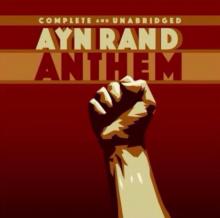 Anthem
Anthem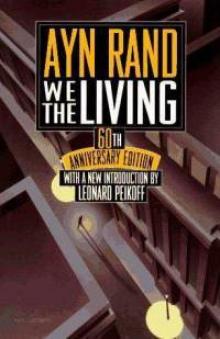 We the Living
We the Living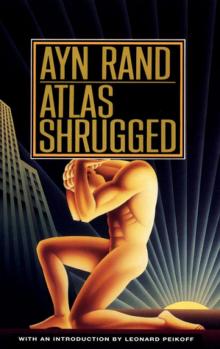 Atlas Shrugged
Atlas Shrugged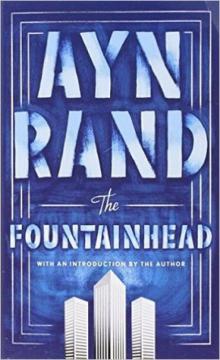 The Fountainhead
The Fountainhead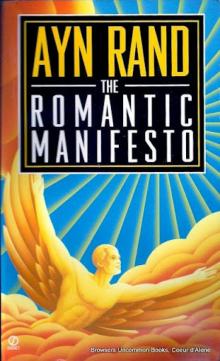 The Romantic Manifesto: A Philosophy of Literature
The Romantic Manifesto: A Philosophy of Literature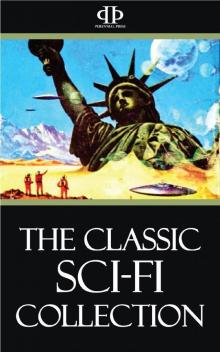 The Classic Sci-Fi Collection
The Classic Sci-Fi Collection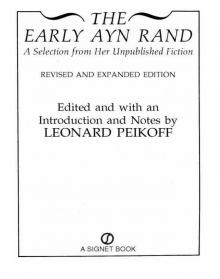 The Early Ayn Rand
The Early Ayn Rand